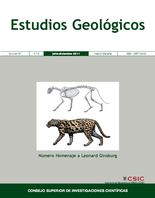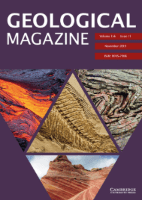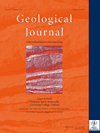
ESTUDIOS GEOLOGICOS-MADRID
Scope & Guideline
Advancing Geoscience Knowledge Through Open Access.
Introduction
Aims and Scopes
- Paleontology and Paleoenvironments:
Research on fossil records, including the study of ancient organisms and their environments, providing insights into historical biodiversity and ecological changes. - Geological Mapping and Structural Analysis:
Utilization of advanced techniques such as remote sensing and GIS to analyze geological structures, mineral deposits, and tectonic evolution. - Mineralization and Geochemistry:
Investigation of mineral deposits, their formation processes, and geochemical characteristics to inform exploration and resource management. - Sedimentology and Stratigraphy:
Study of sedimentary processes and rock layers to understand Earth's history, including changes in climate and sea level. - Environmental Geology and Climate Change:
Research on the impacts of geological processes on the environment and the implications of climate variability on geological formations.
Trending and Emerging
- Integration of Remote Sensing and GIS Technologies:
The increasing use of satellite imagery and geographical information systems for geological mapping and mineral exploration showcases a trend towards technological advancement in geological research. - Paleoenvironmental and Paleoclimatic Reconstruction:
There is a growing interest in reconstructing past environments and climates using various proxies, which aids in understanding current climate change and its geological implications. - Multidisciplinary Geological Research:
The integration of various scientific disciplines (e.g., biology, chemistry, environmental science) in geological studies is on the rise, facilitating a more holistic understanding of geological processes. - Focus on Mineral Resource Exploration:
With the demand for minerals increasing, there is a notable trend in research dedicated to exploring and characterizing mineral resources, particularly in under-explored regions. - Application of Geochemical Techniques:
The use of advanced geochemical analysis in studying mineral deposits and environmental changes is becoming more prevalent, reflecting advancements in analytical technologies.
Declining or Waning
- Historical Geology with Limited Novel Findings:
There seems to be a reduction in studies focusing solely on historical geological formations without new insights or methodologies applied, indicating a shift towards more contemporary and applied geological research. - Paleoclimatology Studies:
Research specifically targeting ancient climate conditions has become less frequent, possibly due to a growing emphasis on current climate impacts and the need for actionable insights. - Non-multidisciplinary Approaches:
There is a noticeable decline in papers that do not integrate multiple disciplines, such as combining geology with biology or environmental science, reflecting a preference for comprehensive, interdisciplinary studies.
Similar Journals

STRATIGRAPHY AND GEOLOGICAL CORRELATION
Unveiling the Secrets Beneath Our FeetSTRATIGRAPHY AND GEOLOGICAL CORRELATION is a prominent scholarly journal published by PLEIADES PUBLISHING INC, featuring a dedicated focus on the fields of geology, stratigraphy, and paleontology. With ISSN 0869-5938 and E-ISSN 1555-6263, this journal has been disseminating significant research findings since its inception in 1994, continuously contributing to the academic discourse through 2024. Despite not currently offering open access, its relevance is underscored by its Category Quartiles for 2023, where it has established itself as Q3 in Geology and Paleontology, and Q2 in Stratigraphy. STRATIGRAPHY AND GEOLOGICAL CORRELATION ranks #29 out of 55 in Stratigraphy and #186 out of 321 in Geology according to Scopus metrics, positioning it within the competitive landscape of Earth and Planetary Sciences. Researchers, professionals, and students are invited to engage with the journal’s content to deepen their understanding and foster innovation within these critical areas of study.

GEOLOGICAL MAGAZINE
Connecting Scholars to the Heart of GeologyGEOLOGICAL MAGAZINE, published by Cambridge University Press, is a premier journal in the field of geology, renowned for its rich legacy since 1864 and ongoing contributions to Earth and Planetary Sciences. With an impressive Q1 ranking in Geology and a Scopus rank of #70 out of 321 journals, it holds a significant position within the academic community, appealing to researchers, professionals, and students alike. The journal covers a wide array of topics, ensuring a comprehensive platform for the dissemination of cutting-edge geological research. Although it does not offer open access, it remains a vital resource for those seeking to stay abreast of advancements in the field. With an enduring commitment to quality, GEOLOGICAL MAGAZINE stands as an essential outlet for scholarly communication and serves as a catalyst for academic discourse within the geological sciences.

GEOLOGIA CROATICA
Championing Open Access in Earth SciencesGEOLOGIA CROATICA is a distinguished open-access journal published by the Croatian Geological Survey, dedicated to advancing the field of Earth and planetary sciences. Since its inception in 1992, this peer-reviewed journal has become an essential resource for researchers, professionals, and students interested in various aspects of geology. With its robust impact factor and a prestigious place in Scopus rankings, ranking 127th out of 321 in Geology and 77th out of 159 in miscellaneous Earth and Planetary Sciences as of 2023, GEOLOGIA CROATICA maintains a strong international presence. It provides a platform for the dissemination of critical research findings, promoting collaboration and knowledge sharing among the global scientific community. By focusing on high-quality manuscripts that cover geological processes, hazards, and resources, this journal is pivotal for anyone looking to contribute to or expand their understanding of geological sciences. The journal's commitment to open access ensures that invaluable research is accessible to all, fostering a more informed and scientifically engaged society.

Austrian Journal of Earth Sciences
Advancing Knowledge in Geology and BeyondThe Austrian Journal of Earth Sciences, published by SCIENDO, is an esteemed open-access journal specializing in the disciplines of geology, paleontology, and stratigraphy. With an ISSN of 2072-7151, this journal has established itself as a significant platform for innovative research and scholarly communication in the earth sciences. Since its inception in 2007, it has continuously expanded its influence, achieving notable rankings in the Scopus database—#113 in Geology, #42 in Paleontology, and #21 in Stratigraphy, demonstrating its commitment to high-quality publications. The journal holds prestigious quartile rankings of Q1 in both Geology and Paleontology and Q2 in Stratigraphy as of 2023, reflecting its impact and relevance in the scientific community. Researchers and students alike are encouraged to explore and contribute to the evolving discourse within this dynamic field, as the Austrian Journal of Earth Sciences fosters collaboration and knowledge sharing across global platforms.

Gondwana Research
Advancing the Frontiers of Geological DiscoveryGondwana Research is a premier academic journal published by Elsevier, specializing in the field of geology, with a robust focus on the geological history and processes of the Gondwana supercontinent. With an impressive impact factor and ranking as Q1 in the 2023 Geology category, it stands as a leading platform for disseminating high-quality research. The journal features articles that advance the understanding of Earth and planetary sciences, making significant contributions to geological education and research. Researchers will find its curated content particularly valuable, as it encompasses a wide array of topics including stratigraphy, paleontology, and tectonics, all relevant to both contemporary and historical geological inquiries. Given its substantial reach and esteemed standing—ranked 5th out of 321 in its field—Gondwana Research plays a crucial role in fostering scientific exchange among global experts. Located in the United States with publication continuity from 1997 to 2024, this journal consistently attracts submissions from leading scientists, ensuring that its readership is kept at the forefront of geological discovery and innovation.

Geologos
Exploring Earth and Beyond: Where Knowledge Meets DiscoveryGeologos is a peer-reviewed journal dedicated to advancing knowledge in the field of Earth and Planetary Sciences. Published by SCIENDO, this Open Access journal has been facilitating unrestricted access to research findings since 2009, ensuring that scholars, professionals, and students can engage with up-to-date scientific discourse without barriers. With an ISSN of 1426-8981 and an E-ISSN of 2080-6574, Geologos is indexed in Scopus, where it currently holds a rank of #111 out of 195 in the General Earth and Planetary Sciences category, reflecting its commendable impact within the discipline. Based in Poland, the journal embraces contributions from international authors, promoting a diverse and inclusive dialogue on topics ranging from geological phenomena to planetary processes. As a Q3 journal in the Earth and Planetary Sciences category, Geologos is committed to enhancing the understanding and appreciation of the Earth's systems, making it an essential resource for those engaged in research and practice within this dynamic field.

NORWEGIAN JOURNAL OF GEOLOGY
Shaping the Future of Geology Through Collaboration.NORWEGIAN JOURNAL OF GEOLOGY, published by the Geological Society of Norway, stands as a vital resource in the fields of geology, geochemistry, petrology, geophysics, oceanography, and paleontology. Since its transition to an Open Access model in 2015, this journal has significantly expanded its reach, allowing for greater dissemination of cutting-edge research and insights. With an ISSN of 2387-5844 and E-ISSN of 2387-5852, the journal is committed to fostering collaboration and knowledge exchange among the scientific community. The journal's categorization in the Q3 quartile across various Earth and Planetary Sciences fields underscores its status as a reputable publication, offering researchers, professionals, and students alike a platform to share their findings and advancements in geology. Continuing through its converged years from 2015 to 2024, the NORWEGIAN JOURNAL OF GEOLOGY plays a crucial role in enhancing our understanding of Earth's processes and materials, making it an important reference for anyone engaged in geoscientific research.

ACTA PETROLOGICA SINICA
Illuminating the Complexities of Earth's CompositionACTA PETROLOGICA SINICA, published by SCIENCE PRESS, is a distinguished journal in the field of geochemistry and petrology, known for its commitment to advancing the understanding of Earth's materials and processes. With an impact factor ranking it in the second quartile (Q2) of its category and a respectable Scopus rank of 64 out of 154, this journal serves as a vital platform for researchers, professionals, and students alike, facilitating the dissemination of innovative studies and findings from 1980 to the present. Its robust editorial board and diverse array of articles make it an invaluable resource for those engaged in the intricate analysis of petrological phenomena and geochemical transformations. Published in China, ACTA PETROLOGICA SINICA provides access to significant original research, reviews, and insights essential for advancing knowledge and fostering collaboration in the earth sciences.

ANNALES SOCIETATIS GEOLOGORUM POLONIAE
Illuminating the Depths of Earth Sciences.ANNALES SOCIETATIS GEOLOGORUM POLONIAE is a distinguished journal published by the Polish Geological Society, focusing on pivotal research in the fields of geology, economic geology, and stratigraphy. With an ISSN of 0208-9068, this journal has established itself as an essential platform for disseminating significant findings and advancements in geological sciences since its convergence in 2008. The journal proudly holds a Q2 quartile ranking in the categories of Economic Geology, Geology, and Stratigraphy as of 2023, indicating its respectable position within the global academic community. Researchers will find its indexed status in Scopus, ranking #138/321 in Geology and showcasing a solid presence in key geological sub-disciplines. While the journal is not open access, it remains a vital resource for professionals and students striving for insight into contemporary geological research. Located in Krakow, Poland, the journal continues to contribute significantly to the understanding of geological processes and resources, making it an indispensable reference for anyone in the field.

GEOLOGICAL JOURNAL
Exploring the Earth's mysteries since 1951.GEOLOGICAL JOURNAL, an esteemed publication by WILEY, has been at the forefront of geological research since its inception in 1951. With an ISSN of 0072-1050 and E-ISSN of 1099-1034, this journal serves as a vital platform for disseminating high-quality, peer-reviewed research in the field of geology. Operating out of the United Kingdom, the journal proudly features a Scopus rank of 80 out of 321 in the Earth and Planetary Sciences category, reflecting its commitment to scholarly excellence, with a 2023 category quartile ranking of Q2. As part of its innovative approach, GEOLOGICAL JOURNAL seeks to foster interdisciplinary collaborations, advancing our understanding of earth processes, materials, and history. Although it does not offer open access options, its robust subscription model ensures that both professionals and students have access to groundbreaking insights. With a publication history that spans over seven decades, the GEOLOGICAL JOURNAL continues to be an indispensable resource for the global geological community, encouraging discoveries that shape our comprehension of the planet.